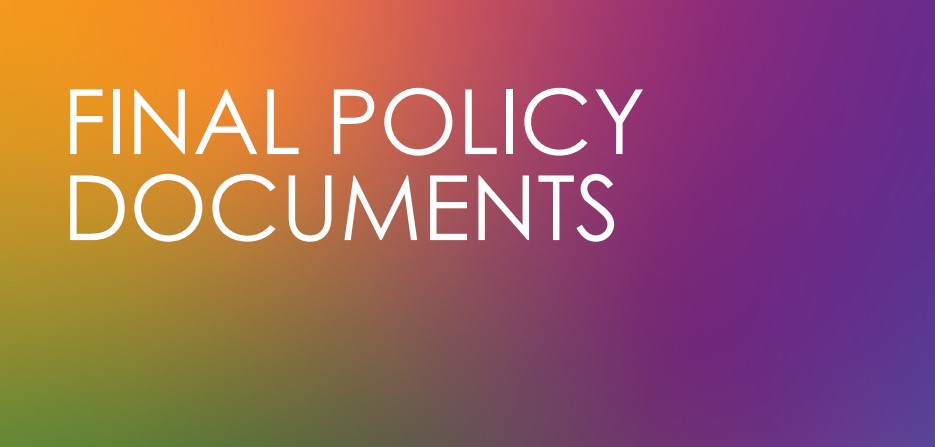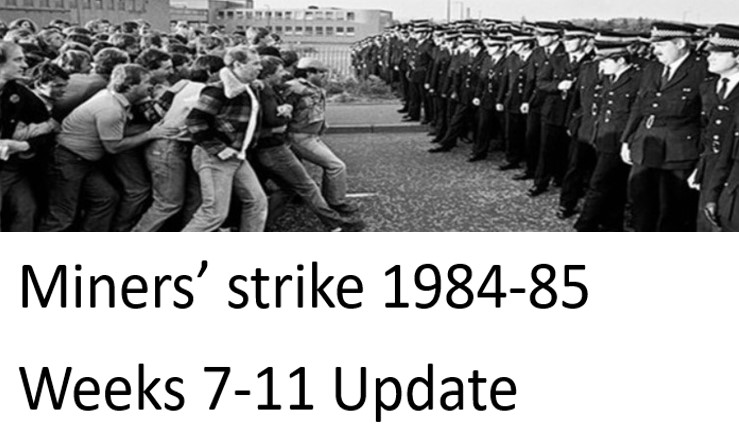By William F Ward
The final version of the National Policy Forum (NPF) report is available to delegates to Labour Party conference. In fact, it ought to be the conference itself that is the paramount policy-making body of the Labour Party, and the final meeting of the NPF perfectly demonstrates the poverty of the modern Labour Party’s policy-making system.
The NPF meeting was rocked by a walkout of union delegates, as well as fierce back-stairs arguments and a further step back from Corbyn-era polices, mustly under pressure from business and their lobbyists. But you would never know that from the glossy booklet which is the official output to the Party.
Instead, the truth has to be pieced together from Twitter, leaks, newspaper articles, briefings to friendly media outlets, a few whispers from Party insiders, and even YouTube. Instead of being an open and transparent process, it is completely opaque to Labour members
The NPF has not even met since 2014, as Jeremy Corbyn and his team believed in democratic discussion and decision-making at Conference. So this was the first meeting in several years of the not-much-missed NPF. The NPF is very useful to the leadership for curtailing discussion at Conference because, as they have resurrected a Blair-time rule that Conference can now not discuss any matter already covered by the NPF – any such motions will be simply ruled ‘out of order’.
The first sign that all was not well at the NPF was a story on July 22 in the Financial Times in the middle of the weekend gathering in Nottingham. The FT reported that two union delegations had “walked out”. A Twitter post clarified that it was GMB and Unite who had walked out because of “hostile negotiations” with the affiliated unions on a rewrite of the ‘New Deal for Working People’.
This was an agreed suite of policies which was going to be in the Labour Manifesto on trade union and workers’ rights, sick pay and redundancy. The unions had made their compromises with each other and with the Labour Party in the construction of the ‘New Deal…’ but now, despite previous claims that it was “set in stone”, “baked in”, etc, they found that the leadership were chipping away at it. What was on offer was now a compromise on a compromise.
Leadership wanted policy agreed – without it having been seen!
Worse than that, it seems that the leadership drones managing the process were refusing to release the new text to the unions to look over, and were expecting them to vote for it sight unseen. Union leaders, correctly, called this a fait accompli and there were complaints about general secretaries being told what to do by ‘Labour staffers’ (you know, those ambitious young men with shiny suits and pointy shoes).

The GMB delegation returned, reportedly after General Secretary, Gary Smith, was actually given the privilege of seeing the draft, and it was all smoothed over as just “missing the dinner”. However, the Unite delegation stayed away, correctly refusing to vote for an ‘agreement’ that they were not allowed to see or read. After the NPF, Unite released a carefully worded statement that they could not support the draft agreed by everyone else without seeing it.
The Unite statement read: “Britain’s leading trade union today refused to give its backing to an important Labour document for government at the National Policy Forum gathering in Nottingham”.
Unite was unable to back the document in full, as it clearly crossed the union’s red lines. This included around workers’ rights in collective bargaining – an area which needs root and branch change, not just tinkering around the edges – as well as workers’ access to unions and a weakening of language around zero-hours contracts.
The process in Nottingham was chaotic, with an attempt to push through changes to the policy document without first sharing them with conference participants, including Unite. As in any negotiation, you simply don’t sign up to something without all the detail and understanding the impact it will have on our members and workers more widely.
As the general election draws nearer, Keir Starmer has to prove Labour will deliver for workers and we need clear policies on this.”
Ann Black’s report confirms ‘blind’ voting
Then there was Ann Black’s blog. She is an NEC member who regularly does report back to CLPs on what goes on in high places. Her ‘On the Record’ blog reported that:
“It’s also the first time that the NPF has voted on text without seeing it. In 2008 a 27-page supplement arrived halfway through the closing session still warm from the printer, but at least it was there. This year some outstanding text was read out by the chair, but the outcome of discussions with the unions was too complex and wide-ranging.
“NPF members voted for it anyway, but I still don’t know what is in it, except for arguments on Twitter. A few amendments were still outstanding but clearly did not have the 35% support needed for a minority position, and the NPF endorsed all other consensus wording before heading home”.
It has to be said, that for all her political faults, Ann Black does at least uphold the principle of representative democracy – she is elected to go to these meetings, and she does report back.
For anyone outside the NEC and NPF, the whole process looks quite astonishing. One of the highest representative bodies in the Labour Party, gathering union general secretaries, NEC members, MPs and elected CLP delegates, are voting for policies they had not seen, and they did not “know what was in” the final document.
That is a big-time failure of representative democracy. People get elected to represent thousands of Party members or even, arguably, millions of trade union members. They then vote for something they haven’t even seen. Worse still, according the CLPD, there is a ‘Code of Conduct’ for the NPF which prevents them reporting back to their electorate in anything but the most general terms. This would explain the guarded nature of Unite’s comments.
Karl Hansen article in Tribune
Then Karl Hansen, former advisor to Andy MacDonald, who covered the Shadow Employment brief under the early Keir Starmer regime, explained what was wrong with the new draft of the “New Deal for Woking People”.

In a well-sourced article in Tribune, he explained that the pledge to create a single legal status of ‘worker’ to cover all but the genuinely self employed had been watered down to “…a vague undertaking to hold a ‘consultation’ on ‘a simpler framework’, which in turn undermined the pledge to ‘give all workers day one rights on the job… by ending the qualifying periods for basic rights’”, which Keir Starmer had previously pledged to implement in his first 100 days.
The ambiguous legal statuses of ‘employee’, ‘worker’ and ‘self employed’ are exactly the territory where Uber, Just Eat and other gig economy capitalists operate. Their lawyers are experts in crafting contracts of employment that withhold rights to sick pay, holiday pay and redundancy pay from working class people. There are millions of construction workers employed under bogus self-employment in Britain today, and the practice is spreading to other groups of workers.
As Karl Hansen pointed out in the Tribune article, the creation of a single status of ‘worker’ would have been transformative. He described it as “load bearing” for the rest of Labour’s programme of workers rights. The new draft will perpetuate the present tiered status for those in work, which in turn creates a ‘Wild West’ for workers’ rights in the British economy.
This in turn undermines other workers who are organised in what is at present stable secure employment, and who form the core of the trade unions’ membership – including the GMB. It is an under-cutters charter.
Karl Hansen explained that “The current system makes workers insecure by design. Workers who have yet to qualify for, or are not entitled to, redundancy pay or protection against unfair dismissal are in a state of precarity – and therefore much less likely to organise and demand improved conditions.”
Bogus self-employment deprives millions of workers of rights
The original ‘New Deal for Working People’ would have set Britain’s 3.7 million precarious workers free to fight for themselves. Keir Starmer’s fait accompli gives workers ‘rights at work’- but allows employers to circumvent them using precarious employment. Rights without enforcement are no rights at all. Unite’s Sharon Graham pointed out that the measures outlined in the original New Deal for Working people did not cost money. So the changes had to be down to lobbying by business.
Meanwhile, over in the CLP section of the NPF, almost all the amendments painstakingly crafted by the left were blown out of the water by Rachel Reeves and Keir Starmer’s blanket assertion that no unfunded spending commitments would be let through.
Sure enough, the left had to be satisfied with very small improvements. Disability Labour secured a pledge of “co-production of policy once in government”, and adherence to the UN Charter for the disabled. Often the left had to be content with pettifogging amendments.
In one example, Ann Black got three words inserted into the housing policy – “and the high costs” – “The lack of certainty and security and the high costs that are now inherent to renting privately takes an immense toll on private tenants, including more than one million children with families.
Leadership’s obsession with ‘fiscal responsibility’
Perhaps the only significant gain made by the CLPs was a pledge to abolish Ofsted. But the big ticket items like water being brought back to public ownership, free school meals for primary children, ending NHS privatisation, scrapping Right to Buy in housing – were all torpedoed by the leadership’s version of ‘fiscal responsibility’. It was one person one vote, but that person was Rachel Reeves!
Of course it is a political choice as to which commitments can be funded or not. No doubt they will find money for Defence procurement or subsidies to business, and we all know that marginally raising taxes on the rich could fund all these policies.
But in a sense none of this matters at present. Millions of people are going to vote Labour at the next election without reading the small print of the NPF. The NPF policies will only become important after the election. In the union walk-outs we can discern the cracks that will become a chasm under a future Labour government.
Even the watered-down ‘New Deal for Working People’ has a few firm pledges, such as an “End the scourge of fire and rehire”, a national programme to insulate homes, the doubling of onshore wind turbine capacity, a tripling of solar energy generation, a publicly-owned energy company as a ‘national champion’, investment to modernise the steel industry. These meagre offerings will be welcome, but given the pressures of big business, even these might be in doubt.
But ultimately, it will be bread and butter issues that will count: living standards, pay, the NHS, social care, Education and housing. The same union tops who voted yesterday for policies sight-unseen, just to back Starmer, will be pushed by their members tomorrow to do something about a Labour leadership that is not protecting their interests.



